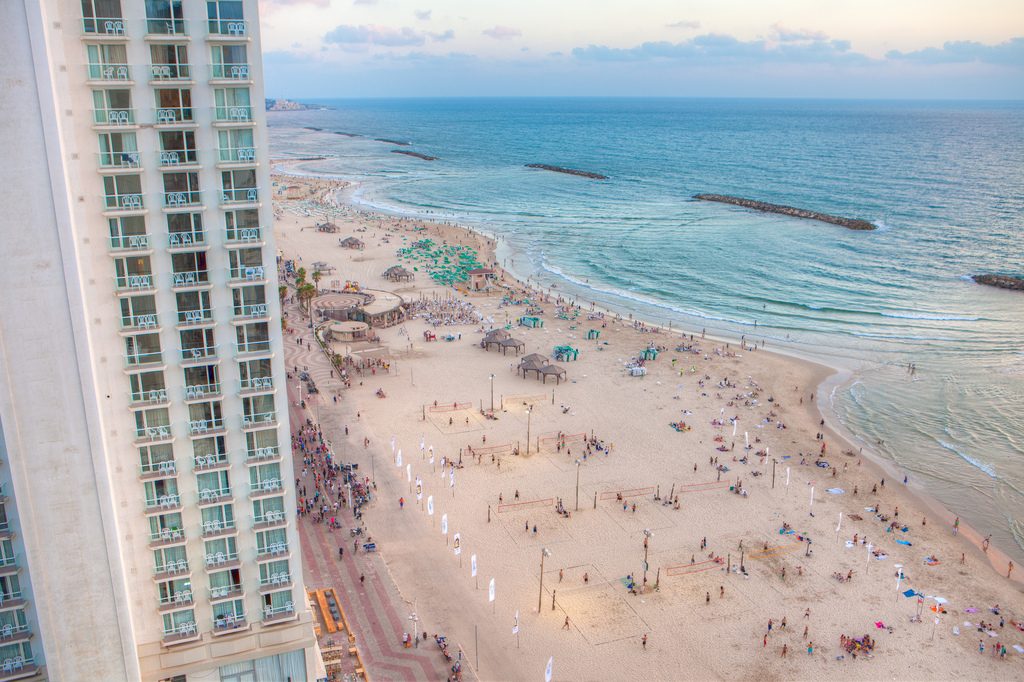Tel Aviv is already widely known as an innovative city, with its startup ecosystem among the world’s top 3, a “green” city, due to its numerous green initiatives for environmental sustainability, the “World’s Smartest City,” providing an array of digital services and technologies to city residents, and a White City, celebrating over 4,000 Bauhaus-style structures.
Now it is furthering its reputation as a creative city, with a spot among the “10 of the Best Literary Cities” in the world by British online newspaper The Independent. In honor of World Book Day 2018, a one-day festival established by the United Nations Educational, Scientific, and Cultural Organization (UNESCO) and designated in the United Kingdom and Ireland for the first Thursday in March. The publication put out a round-up of cities it deemed worthy of the title last week, with the Mediterranean metropolis joining international cities like Paris, Dublin, Sao Paolo, Los Angeles, Lagos, Saint Lucia, Johannesburg, and Seoul.
Though Israel is young, the country has a significant presence prolific and influential writers that have carved out a name for themselves, including authors and poets who have both resided in Tel Aviv and garnered international and local acclaim, winning top literary prizes and even having their homes historically preserved and streets named in their honor.
The Independent mentions Rachel Bluwstein (known as Rachel or Rachel the Poet) and Hayyim Nahman Bialik, whose Bauhaus-style home just off Tel Aviv’s Allenby Street is now a museum, as examples if Tel Aviv’s literary prowess.
Tel Aviv Mayor Ron Huldai welcomed the placement on the list, saying in a statement that he was proud of the city’s achievements and that the municipality “places great emphasis on the city’s cultural field, encourages reading and literary writing, and will continue to act to make reading accessible to its residents.”
“Books shape the face of our world in two ways: the first is direct when a book brings about change and transforms the face of a country, the other is indirect – the books change our way of seeing the world,” he said.

Tel Aviv. Flickr
Tel Aviv has over the years produced a variety of impressive literary figures in Israeli culture, many who have inhabited the city streets themselves and later had those streets and locations named after them. There’s Shai Agnon Street, named after the German-born Yiddish and Hebrew author, poet, and folklorist Shmuel Yosef Agnon, who won the Nobel Prize in Literature in 1966 and lived in Jaffa and Jerusalem. There’s Ahad Ha’am Street, named after the Hebrew pen name of Asher Zvi Hirsch Ginsberg, known for writing essays on cultural and traditional Zionism.
Then, there’s Bialik Street of course, named for Hayyim Nahman Bialik, the poet whose works were so transformative in Israeli and Tel Avivian culture, that the Bialik Prize for Hebrew literature was established in 1933 in his honor and his home was converted into a museum on a street that now bears his name. It opened to the public in 2009 after undergoing many years of renovation and restoration. Along with ceramic art, it also houses archives of Bialik’s original work.
Bialik’s home is also part of a breathtaking plaza called Kikar Bialik, where parades, concerts, dancing, and other events still take place to this day.
Sign up for our free weekly newsletter
SubscribeIsrael’s modern literary genius
Though born in Jerusalem, David Grossman is currently one of Israel’s most lauded authors, having just won the 2018 Israel Prize for Literature, Israel’s highest literary honor. He was also announced the winner of the Man Booker International Prize of 2017 for his book “A Horse Walks Into A Bar,” becoming the first Israeli writer to win the award and beating out another cultural heavyweight, Amos Oz. Oz, who while writing extensively about the city of his birth, Jerusalem, also wrote with fondness about Tel Aviv. The city was featured in his memoir, the international bestseller “A Tale of Love and Darkness,” which was made into a movie starring and directed by Israeli-American actress Natalie Portman.
Currently living in Tel Aviv, Etgar Keret is an influential writer of contemporary Israeli literature who once told the Daily Beast that living in the “bubble of Tel Aviv” is “a strong point” for his works. He also said that the “strongest effect” the city has had on him has to do with its intensity. “When I think of Tel Aviv, it always felt to me like a short story,” he said, “Actually, in Israel, it’s funny because all the novelists basically have Jerusalem in their history, and Tel Aviv was always the city of poets. I think it’s something to do with the fact that it’s so condensed, you know, so in your face, so here and now, that it’s something I really feel in my stories.”
He later said that when he thinks of Tel Avivian writers, he thinks of Yoram Kaniuk but also loves the work of Yaakov Shabtai and David Avidan.
Tel Aviv as a library city
Libraries play an important role in the modern literary life of the city, notes Miriam Pozner, Director of the Libraries Department of the Tel Aviv-Jaffa Municipality. “Urban libraries in Tel Aviv-Jaffa are also used as cultural centers: more than 2,000 cultural activities took place in various libraries and in the Beit Ariela Cultural Center throughout the year – story hours, plays, lectures and more which attracted about 80,000 participants.”
While Tel Aviv operates 22 public libraries, according to Pozner and the municipality, The Independent refers to the Tel Aviv beach as “unquestionably” the best place to read, saying that “it’s even better than cafe culture” thanks to the lending libraries to be found there — for free — in multiple languages. There are a total of nine lending libraries in Tel Aviv, including one on Rothschild Boulevard “which enables reading enthusiasts from Israel and abroad to enjoy good literature anywhere in the city,” Pozner said.
Related posts

Rehabilitation Nation: Israeli Innovation On Road To Healing

Israeli High-Tech Sector 'Still Good' Despite Year Of War







Facebook comments